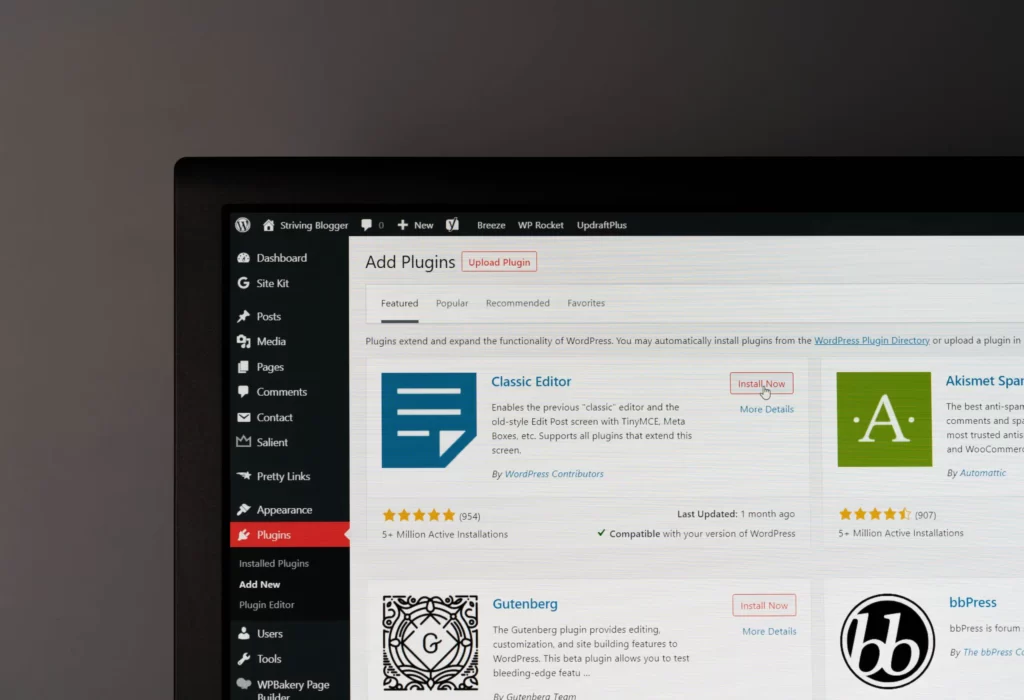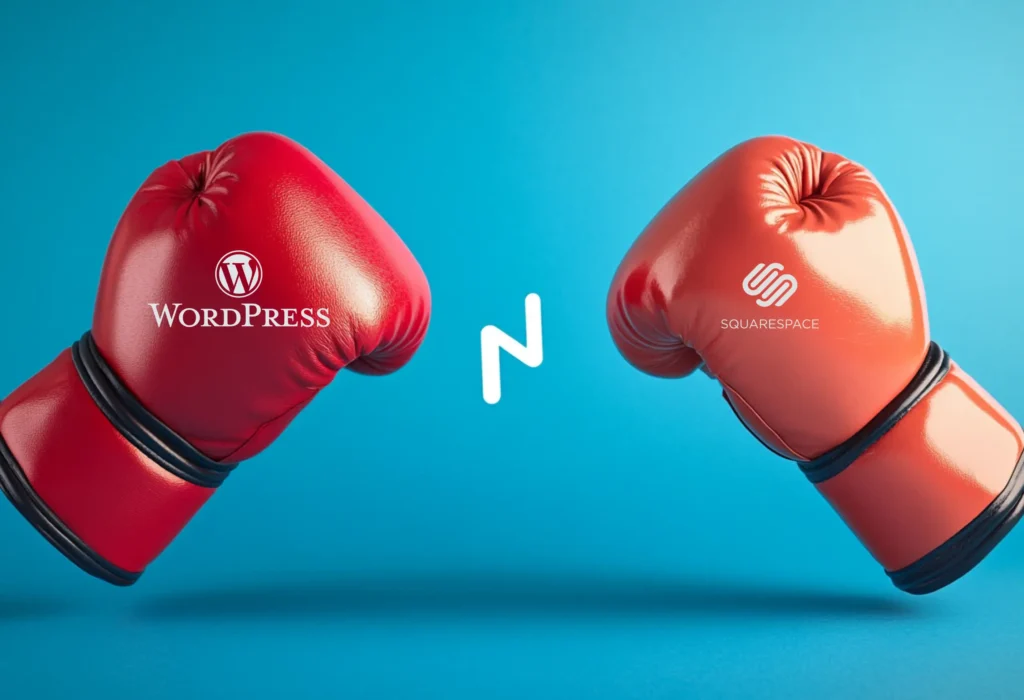
How to Find the Benchmark for SEO Organic Traffic in GA4
Investing in SEO but not sure if it’s actually working? You’re driving organic traffic to your site, but how do you measure its impact without


Table Of Contents
WordPress has emerged as one of the most popular content management systems (CMS) and website-building platforms globally. It empowers both beginners and experienced users to create and manage websites, blogs, online stores, and more with utmost ease. This article dives deep into the world of WordPress, exploring its history, features, usability, customization options, SEO capabilities, and more.
WordPress, initially launched in 2003, started as a simple blogging platform. Over the years, it has evolved into a versatile CMS that supports a wide range of websites. Whether you're an individual blogger, a small business owner, or a large enterprise, WordPress offers a robust foundation to build and maintain your online presence.

WordPress was created by Matt Mullenweg and Mike Little as an open-source project. Its growth and adoption have been remarkable, transforming it into a powerhouse that now drives more than 40% of all websites on the internet. From its early days as a blogging tool, WordPress has undergone continuous development to become a versatile platform suitable for various web projects.
WordPress.org and WordPress.com are two different platforms that are often confused with each other due to the similarity in their names. The main difference between them lies in hosting and control. WordPress.org is a self-hosted platform that requires users to find and manage their own hosting provider. Users have complete control over their websites, allowing them to customize and monetize to their liking. This platform is ideal for those who want more flexibility and control over their website. On the other hand, WordPress.com is a hosting service provided by Automattic, the company behind WordPress. They host the website and take care of the technical aspects, but users have limited control over customization and monetization options. This platform is best suited for beginners or those who prefer a more hands-off approach to website management. Overall, the choice between WordPress.org and WordPress.com depends on individual preferences and needs for hosting, control, and customization.
WordPress prides itself on its intuitive user interface. Even individuals without technical expertise can create, edit, and manage content effortlessly. The dashboard is designed to be beginner-friendly while still offering advanced options for experienced users.
One of WordPress's standout features is its customization flexibility. With a vast library of themes and templates, you can give your website a unique look and feel. Customization goes beyond aesthetics; you can tailor functionality and features to suit your specific needs. In addition to the standard WordPress page builder, WordPress is free to many additional page builders such as Elementor. Since WordPress is open-source software, many of the world's best developers like to create new and innovative softwares amongst some of the best WordPress plugins.
WordPress offers a wide array of themes and templates, both free and premium, catering to various industries and purposes. These pre-designed layouts streamline the website-building process and ensure a professional appearance. Templates make running a WordPress blog one of the best website platforms to work with. There are thousands of free WordPress themes and plugins to customize your website.
Plugins are like apps for your WordPress site, adding new features and enhancing functionality. Whether you need SEO optimization, social media integration, e-commerce capabilities, or more, there's likely a plugin available to meet your requirements.
To embark on your WordPress journey, you'll need a domain name and a hosting provider. Many web hosts offer one-click WordPress installations, simplifying the setup process. Once installed, you can access your site's dashboard to begin crafting your online masterpiece.
WordPress.com offers WordPress hosting, but there are many more cheap and better performing options such as Tona Hosting. WordPress is an excellent open-source software that usually is offered with 1-click install for most hosting platforms. Install WordPress today with Tona Hosting.

WordPress's editor makes content creation a breeze. You can write and format posts and pages using a familiar word processor-style interface. The editor supports multimedia integration, allowing you to embed images, videos, and more. As a WordPress admin, you can assign WordPress writer and editor roles. This way you have extra WordPress security against your copywriters tampering with any free WordPress plugins.
Visual content is crucial for engaging visitors. WordPress enables you to effortlessly upload and insert images and videos into your content. You can also optimize media for faster loading times.
Categories and tags help organize your content for easier navigation and improved SEO. They create a hierarchical structure that aids both users and search engines in understanding your site's content. WordPress is a content management platform that makes uploads and premium WordPress themes to display your content in a clean and easy-to-read way.
WordPress's theme directory offers a diverse range of themes suitable for various niches and design preferences. You can filter themes based on features, layouts, and industries to find the perfect match. Before you start working on your new WordPress website, be sure to browse the perfect theme for your project.
While themes provide a great starting point, you can customize them to align with your brand identity. From color schemes to layout adjustments, WordPress's customization options are virtually limitless.
When looking for WordPress plugins and themes, there are several places where one can find them. The most popular and trusted source is the official WordPress.org website. Here, you can browse through a vast collection of free themes and plugins that have been tested and reviewed by the WordPress community. The website also provides detailed information about each plugin and theme, including user ratings and reviews. Another popular option is to search for plugins and themes on third-party marketplaces such as CodeCanyon and ThemeForest. These marketplaces offer a wide range of both free and premium plugins and themes, created by independent developers. They often provide additional features and functionalities compared to the free ones found on WordPress.org. Additionally, there are numerous blogs and websites dedicated to curating and reviewing plugins and themes. These resources can provide valuable insights and recommendations on the best plugins and themes to use for specific purposes. Overall, there are plenty of options available when it comes to finding WordPress plugins and themes.

Plugins extend the capabilities of your WordPress site. From contact forms to e-commerce platforms, there's a plugin for almost everything. However, it's essential to choose reputable plugins to ensure compatibility and security.
For SEO, Yoast SEO plugin is highly recommended, streamlining optimization efforts. WooCommerce, on the other hand, turns your site into an e-commerce powerhouse. These plugins exemplify the versatility of WordPress.
WordPress's user-friendly interface doesn't sacrifice SEO capabilities. You can optimize your content's meta titles, descriptions, and headings to improve your site's search engine visibility. WordPress SEO is a long-term investment into your digital marketing strategy. When you have an SEO-optimized website build on WordPress, your statistics and organic visitors stay consistent longer than any PPC or Social Media campaigns.
Plugins like Yoast SEO and All in One SEO Pack simplify the optimization process. They provide guidance on keyword usage, readability, and other crucial SEO factors.
Regular updates are critical to maintaining the security and functionality of your site. WordPress frequently releases updates that address vulnerabilities and introduce new features.
Security plugins, such as Wordfence and Sucuri, bolster your site's defenses against threats like malware and hacking attempts. They provide real-time monitoring and protection.
WordPress offers different user roles, such as administrators, editors, authors, and contributors. Assigning appropriate roles ensures that each team member has access only to the necessary features.
With user roles, you can control who can publish, edit, and delete content. This feature is especially useful for collaborative projects or multi-author blogs.
WordPress, combined with plugins like WooCommerce, empowers you to create a fully functional online store. You can showcase products, manage inventory, and process payments seamlessly.
WooCommerce facilitates product management, order processing, and payment gateways. It provides a comprehensive solution for businesses venturing into e-commerce.
In the mobile-driven era, having a responsive website is crucial. WordPress themes are designed to adapt to various screen sizes, ensuring a seamless user experience across devices.
Accessibility features, such as alt text for images and keyboard navigation, make your site usable for individuals with disabilities. WordPress supports these features, promoting inclusivity.
Website speed impacts user satisfaction and SEO rankings. Caching plugins like W3 Total Cache and WP Super Cache optimize loading times by storing frequently accessed data. In order to keep your website performing optimally, it is best to always install the latest version of WordPress Software.
Optimizing images reduces page load times. Plugins like Smush automatically compress images, while lazy loading defers the loading of off-screen images until they're needed.
WordPress boasts a vibrant community of users and developers. Online forums and communities provide a platform to seek help, share insights, and stay updated on the latest developments.
Extensive documentation and tutorials are available for WordPress users of all levels. Whether you're troubleshooting an issue or learning new skills, these resources are invaluable.

If you are looking to build a business website, WordPress is definitely an option worth considering. With its user-friendly interface and vast array of themes and plugins, it allows for easy customization and management of your website. WordPress is highly popular and widely used, so you can find plenty of online resources and support if needed. Additionally, it is known for its search engine optimization (SEO) capabilities, which can help improve your website's visibility and drive more traffic. WordPress is also constantly updating and evolving, which ensures that your website will stay current and up-to-date. However, it is important to note that WordPress may not be suitable for every business. If you are looking for a more complex or customized website, you may need to consider alternative options. Additionally, if you are not familiar with WordPress or don't have the time to learn, it may be better to outsource the development and management of your website to a professional.
What Kind Of Websites Can WordPress Make? WordPress is a highly versatile content management system that can create a wide range of websites. It is not limited to just blogging sites but can also be used to build corporate websites, e-commerce stores, online portfolios, community or social networking sites, and even e-learning platforms. With its extensive collection of themes and plugins, WordPress can transform into any type of website imaginable. For businesses, WordPress offers a variety of features including customizable themes, SEO-friendly structure, and a user-friendly interface for easy updates and management. It also provides powerful e-commerce functionality through plugins like WooCommerce, making it an ideal platform for online stores. Artists and creatives can showcase their portfolios through themes specifically designed for art, photography, or design. Furthermore, WordPress can be used to create forums, membership websites, or online courses for educational purposes. In short, WordPress is a versatile platform that can create virtually any type of website you can think of.
Are you eager to create your own stunning website but new to the world of WordPress? Look no further! Tona Designs is excited to announce our upcoming Free WordPress Course, designed to equip you with the skills and knowledge needed to build a professional website from scratch.
Course Overview: Our comprehensive WordPress Course is tailored for beginners, guiding you through each step of the website creation process. Whether you're an entrepreneur, blogger, small business owner, or simply someone who wants to showcase their work, this course will empower you to bring your vision to life.
WordPress's journey from a blogging tool to a versatile CMS is a testament to its adaptability and user-centric design. With its user-friendly interface, customization options, plugins, and robust community support, WordPress empowers users to create captivating websites without extensive technical knowledge. Embrace the power of WordPress to build an online presence that truly reflects your brand and vision.
1. Is WordPress suitable for e-commerce websites? Yes, WordPress can be transformed into a powerful e-commerce platform using plugins like WooCommerce.
2. Do I need coding skills to use WordPress? No, WordPress's user-friendly interface allows individuals without coding skills to create and manage websites effectively.
3. Are there security risks associated with WordPress? Like any other platform, WordPress can be vulnerable to security threats. However, regular updates and security plugins help mitigate these risks.
4. Can I migrate my existing website to WordPress? Yes, you can migrate your content from other platforms to WordPress using various migration tools and services.
5. Is WordPress only for blogging? While WordPress started as a blogging platform, it has evolved into a versatile CMS suitable for various types of websites, including blogs, portfolios, business sites, and online stores.
Other Powerful Reads
Digital Marketing Blog

How to Find the Benchmark for SEO Organic Traffic in GA4
Investing in SEO but not sure if it’s actually working? You’re driving organic traffic to your site, but how do you measure its impact without

WordPress vs. Squarespace: Choosing the Right Platform for Your Business Website
Introduction to WordPress and Squarespace Struggling to decide which website platform fits your business goals and budget? Let’s break it down. When it comes to

The Top 40 Attorney Websites on The Internet
Why Is A Website Important For Lawyers? If you own a law firm in 2025, having an optimized law firm website is a necessity. With